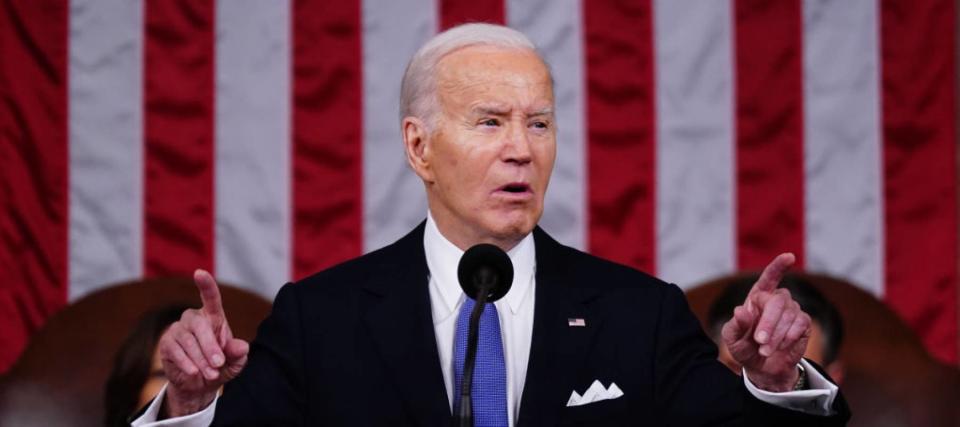President Biden’s budget blueprint would raise one tax rate to 44.6% — here is how the changes could impact you

President Joe Biden has a message for the wealthiest Americans: get ready to pay your fair share.
Following his State of the Union address last week, Biden announced his federal budget proposal — including his plans to cut taxes for working families by increasing them for both the wealthy and big corporations.
Don't miss
Commercial real estate has beaten the stock market for 25 years — but only the super rich could buy in. Here's how even ordinary investors can become the landlord of Walmart, Whole Foods or Kroger
Cost-of-living in America is still out of control — use these 3 'real assets' to protect your wealth today, no matter what the US Fed does or says
Anything can happen in 2024. Try these 5 easy money hacks to help you make and save thousands of dollars in the new year (they will only take seconds)
The budget blueprint, which would be for fiscal 2025 (which begins in October), will serve as the first of many tax battles expected to go down in Washington over the next year.
Republicans have already taken issue with the proposed $7.3 trillion budget, with House of Representatives Speaker Mike Johnson referring to it as an “insatiable appetite for reckless spending” and a “disregard for fiscal responsibility,” according to a Reuters report.
While it remains to be seen if Biden’s policy priorities will make it into the final draft of the budget since that’ll require approval from a Republican-led Congress, here’s a closer look at how some of these proposals could impact Americans.
Capital gains
One major area of contention is the fact that Biden’s budget calls for a 44.6% federal rate on investment income and other earnings for those making more than $1 million.
This income, known as capital gains, includes any profits from selling an asset, such as stocks, cryptocurrencies and real estate. Any gains in the asset’s valuation are subject to tax, just like any other income. But keep in mind that only gains that come from the sale of an asset are subject to this tax.
As it stands, Biden’s budget proposal would essentially increase the capital gains tax to match the standard taxation of wage and investment income.
To break this down further, that would mean long-term capital gains for those earning at least $1 million would be taxed at a whopping rate of 39.6% — a significant increase from 20%.
And the wealthiest Americans will also be asked to step up their contributions to the Medicare tax by increasing their rate to 5% (from 3.8%) in an effort to buttress the program’s trust fund. Along with the capital gains rate, this brings the wealthiest taxpayers’ liability up to a 44.6% federal rate on investment income and other earnings.
The Biden administration claims this would reduce deficits as a share of the economy over next decade. However, critics worry these higher taxes lead to decreased economic output and growth, reduce U.S. competitiveness and further complicate the tax code.
Read more: Generating 'passive income' through real estate is the biggest myth in investing — but here's 1 surefire way to do it with as little as $10
A second death tax
The plan also proposes taxing assets when an owner dies, ending a benefit that currently allows unrealized appreciation to go untaxed when transferred to an heir.
In essence, death taxes are imposed on a person’s estate upon their passing. These taxes are the responsibility of the beneficiary who receives the property via the deceased’s will or estate.
These taxes are also referred to as estate taxes, death duties and inheritance taxes, and generally apply to estates and inheritances over a specific value.
The Biden administration’s federal budget plan for fiscal 2025 calls for taxing unrealized capital gains at death above a $5 million exemption ($10 million for joint filers), resulting in mandatory capital gains at death, in addition to the current death tax.
Where does it go from here?
Biden’s budget proposal will be flipped to Congress, which is in charge of writing the federal budget. The draft prepared by the White House is viewed as the starting point for negotiations between the president’s administration and lawmakers moving forward.
However, Biden’s proposal will likely undergo a major facelift as the Republican-controlled House is unlikely to go along with many, if not most, of the recommendations, specifically those that raise taxes on the wealthy.
What to read next
Rich young Americans have lost confidence in the stock market — and are betting on these 3 assets instead. Get in now for strong long-term tailwinds
Don't let high car insurance rates drain your bank account — find how you can pay as little as $29 a month
Millions of Americans are in massive debt in the face of rising costs. Here's how to get your head above water ASAP
This article provides information only and should not be construed as advice. It is provided without warranty of any kind.

 Yahoo Finance
Yahoo Finance 